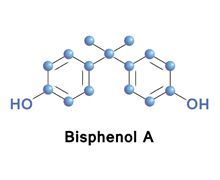
The prevalence of exposure to chemicals such as bisphenol A (BPA) in our everyday lives is a cause for concern but new research shows there is a way to fight back. While some exposure may not be avoidable the good news is it appears the damage can be reversed through healthy eating. Researchers at Harvard Medical School saw fertility issues in nematodes triggered by BPA reversed with the use of coenzyme Q10 (CoQ10).
BPA is an industrial chemical used to make plastics and can be found in things such as food storage containers, inner can coatings, sandwich bags and water bottles. It is a known endocrine disruptor and has been linked to fertility issues. Researchers sought to understand the impact antioxidants might have in protecting cells.
The article published in the journal Genetics showed it was possible to reverse the chemically induced damage in the small worms. CoQ10, which is produced by the body and found in beef and some fruits and vegetables, is a powerful antioxidant. It reduced oxidative stress and cell damage caused by BPA through the process of donating its electrons to stabilize free radicals.
"BPA has oxidation potential as it's chemically unstable and produces reactive oxygen and nitrogen species,” said Maria Fernanda Hornos Carneiro. “When the antioxidant reserves in cells [electron donors] run out, the amount of reactive oxygen and nitrogen increases. Because of their chemical instability, they 'poach' electrons from mitochondria and other cellular organelles, cell membranes, proteins, and even DNA, damaging cells significantly and potentially causing cell death. If this problem becomes extensive, it poses a major threat to the organism."
Scientists tracked the number of fertilized eggs laid and hatched by the nematodes and measured it against the number that reached adulthood. Researchers believe the issues detected in this process are comparable to difficulty in becoming pregnant.
"BPA is a chemical contaminant that acts as an endocrine disruptor, causing cellular oxidative stress [an imbalance between oxidant and antioxidant molecules], which results in damage to gametes and embryos," said Hornos Carneiro, who conducted the study under the supervision of HMS Professor Monica Paola Colaiácovo. "In the study, the worms exposed to BPA and given CoQ10 displayed lower egg cell death rates, less DNA breakage and fewer abnormalities in chromosomes during cell division, as well as less cellular oxidative stress."
The BPA exposure the nematodes faced was estimated to equate what is experienced by humans.
"We know it's practically impossible to avoid exposure to BPA and similar contaminants in this day and age, so we looked for a strategy to minimize the harm done,” Hornos Carneiro said. “Many studies have shown that age reduces fertility in women, and because exposure to BPA [and other endocrine disruptors] occurs throughout life, it's not yet possible to estimate separately the extent to which observed infertility is due to exposure to toxic chemicals in the external environment and how much is due to aging."
Researchers were able to see in real time the process of cell division and embryo formation in the worms. They observed damage by monitoring a protein involved in DNA breakage and repair.
"One hypothesis is that the increase in DNA breakage [and inefficient repair] was due to a rise in gonad oxidative stress caused by BPA," Hornos Carneiro said. "Because of oxidative stress, mitochondrial membrane potential was significantly altered in the worms exposed only to BPA, while in the group that received the CoQ10 supplement, this marker was much improved."
